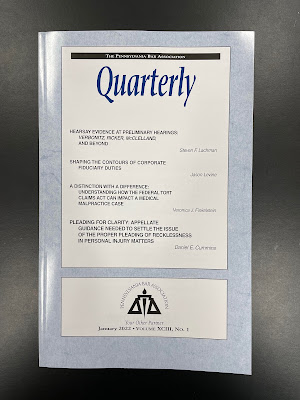Plaintiffs Have Another Banner Year in Civil Litigation, Part 1
By Daniel E. Cummins | December 09, 2021

Daniel E. Cummins, Clarks Summit firm Cummins Law. Courtesy photo
Where There Is a Will, There Is a Way
The year 2021 proved to be another banner year for the plaintiffs bar in terms of securing important civil litigation court decisions that favor plaintiffs’ causes, some of which overturned decades of precedent going the other way. The concerted, and admirable, effort of the plaintiffs bar in continually fighting their good fight and in banding together to support certain judicial candidates to ensure that they make it up onto the bench continues to pay off in spades and in settlements. In essence, as confirmed by the decisions reviewed in this two-part article, where there is a will, there is indeed a way.
This first part of the article will review important decisions and trends in the automobile insurance law arena over the past year, and the forthcoming second part of the article will review the notable decisions in the area of general civil litigation law.
Household Exclusion
Back in 2019, the plaintiffs bar finally prevailed, after decades of effort, in convincing the Pennsylvania Supreme Court to rule that the household exclusion, found in automobile insurance policies, was invalid and unenforceable. The Pennsylvania Supreme Court ruled in this fashion in Gallagher v. GEICO, 201 A.3d 131 (Pa. 2019), and confirmed the shift of the pendulum toward plaintiff’s causes.
The Pennsylvania Supreme Court fashioned its decision in Gallagher v. GEICO as eradicating the household exclusion across the board. While federal court judges addressing the validity of the household exclusion thereafter largely followed the Pennsylvania Supreme Court’s mandate, some state court appellate and trial judges limited the Gallagher v. GEICO decision to its facts and noted that the household exclusion remained valid and enforceable in certain circumstances.
This year, the Pennsylvania Supreme Court had an opportunity to revisit the household exclusion again in the case of Donovan v. State Farm Mutual Automobile Insurance, 2021 Pa. Lexis 3394 (Pa. Aug. 17, 2021). In Donovan, the Pennsylvania Supreme Court answered questions certified to it by the U.S. Court of Appeals for the Third Circuit on issues surrounding inter-policy stacking and the household exclusion.
After finding that the stacking waiver form at issue in this case was invalid as applied to inter-policy stacking claims, the Pennsylvania Supreme Court went on to rule that the policy’s household exclusion was also unenforceable absent a valid written waiver of inter-policy stacking, because the language of that exclusion was incompatible with stacking. In this regard, the court cited to its previous decision in the case of Craley v. State Farm Fire and Casualty, 895 A.2d 530 (Pa. 2006).
The court in Donovan also reiterated its previous decision in Gallagher v. GEICO and again ruled that the household exclusion provision is invalid since it acted as a de facto waiver of stacking, when Pennsylvania law requires the carrier to secure a written waiver of stacked coverage to be secured from an insured.
It remains to be seen whether the federal courts and the lower state courts will now all fall in line and find that the household exclusion is invalid regardless of the facts presented.
Regular Use Exclusion
In a case of appellate first impression of Rush v. Erie Insurance Exchange, No. 1443 EDA 2020 (Pa. Super. Oct. 22, 2021), the Pennsylvania Superior Court affirmed a Northampton County Common Pleas Court decision in a declaratory judgment action and held that the regular use exclusion found in motor vehicle policies is unenforceable because it violates the motor vehicle financial responsibility law (MVFRL).
The regular use exclusion typically holds that a carrier need not provide UM or UIM coverage to a person who, unbeknownst to the carrier, is driving a vehicle that is regularly available for the use of that person and which vehicle is not covered under that carrier’s policy.
In this Rush case, a police officer was injured while driving a police car that was regularly available for his use. After securing a recovery against the drivers of the other vehicles in the accident, the police officer turned to his own personal automobile policies for UIM coverage.
Erie responded by asserting that the Regular Use Exclusion precluded coverage under the Erie Insurance policies.
In ruling that the regular use exclusion was unenforceable, the Superior Court found that the regular use exclusion impermissibly limits the scope of UIM coverage required by Section 1731 by precluding coverage if an insured is injured while using a motor vehicle that the insured regularly uses but does not own. Interestingly, this affirmance was based upon a different reasoning than the trial court that had instead relied upon the improper de facto waiver analysis set forth in the Gallagher v. GEICO household exclusion decision noted above.
Sudden Emergency Doctrine
In the case of Graham v. Check, 243 A.3d 153 (Pa. Dec. 22, 2020)(Op. By Wecht, J.), the Pennsylvania Supreme Court favored another plaintiff’s viewpoint when it addressed the standards for when the sudden emergency defense should be applied in a motor vehicle accident case.
In the majority opinion, it was reaffirmed that the burden of supporting the application of the sudden emergency doctrine lies with the party asserting it. Also reaffirmed was the rule that, if the emergency could have been avoided by the exercise of reasonable care, the doctrine should not be applied or included in the instructions to the jury.
The court then turned to the application of the sudden emergency doctrine in cases where a plaintiff was crossing the street within a crosswalk and is hit by an approaching motorist. In this regard, the court acknowledged that “since the advent of the automobile, Pennsylvania law has also imposed a heightened standard of care upon drivers to exercise particular vigilance when it is reasonably foreseeable that a pedestrian will cross their path, particularly at intersections.” Accordingly, the court found that the application of the sudden emergency doctrine is to be “counterposed” against the “bedrock principle that a driver bears a heightened duty relative to pedestrians crossing at intersections.
In this pedestrian versus motor vehicle accident case of Graham v. Check, the Pennsylvania Supreme Court found that the trial court in this case erred in instructing the jury on the sudden emergency doctrine as the evidence in the case failed to lay a foundation for the provision of that instruction to the jury.
In light of this decision by the Pennsylvania Supreme Court it is likely that the application of the sudden emergency doctrine will no longer be automatic in dart-out pedestrian cases, particularly in the case of a pedestrian who is within a crosswalk at the time of an incident.
Allegations of Recklessness
In recent years, there has been an increase in plaintiffs regularly pleading allegations of recklessness in personal injury cases, even in the absence of outrageous facts and circumstances.
This has given rise to a split of authority among the trial court judges with regards to whether or not to grant preliminary objections asserted by civil litigation defendants to such claims. There are even some splits of authority on this issue within some of the same county courts.
One line of state court judges holds fast to the longstanding maxim that Pennsylvania is a fact-pleading state and that, therefore, claims of recklessness in personal injury matters must be supported by allegations of facts of an outrageous nature in order to be pursued. See Hilferding v. Zinn, No. 2020-SU-002187 (C.P. York Co. March 5, 2021 Flannelly, J.)
These judges typically cite to the case of Ammlung v. City of Chester, 302 A.2d 491 (Pa. Super. 1973), in support of their decisions. Research has revealed decisions from at least 18 different county courts of common pleas that have ruled that plaintiffs must support claims of recklessness with sufficient outrageous facts or risk having that claim dismissed.
Another line of state court judges in at least 9 different county common pleas courts have gone the other way and have ruled that claims of recklessness can be pleaded with reckless abandon in any personal injury case whatsoever, regardless of the facts presented. See e.g. Clauss-Walton v. Gulbin, No. 20-CV-4860 (C.P. Lacka. Co. May 21, 2021 Nealon, J.); Benedict v. Giombolini, No. 21-CV-1134 (C.P. Lacka. Co. Aug. 18, 2021 Gibbons, J.).
These judges allowing claims of recklessness in any case whatsoever rely upon the case of Archibald v. Kemble, 971 A.2d 513, 519 (Pa. Super. 2009), appeal denied, 989 A.2d 914 (Pa. 2010). In Archibald v. Kemble, the Superior Court noted in language that is arguably dicta, that a claim of recklessness on the part of a defendant amounts to an averment regarding the state of mind of a defendant at the time of an accident and that, under express provisions of Pa.R.C.P. 1019(b), such averments as to the state of mind of a party may be generally pleaded in a personal injury complaint.
While the cases of Ammlung and Archibald have provided mixed signals from the appellate courts on this issue, in its most recent pronouncement, the Pennsylvania Superior Court, in the personal injury case of Valentino v. Philadelphia Triathlon, 150 A.3d 483, 488-489 (Pa. Super. 2016), affirmed a trial court’s sustaining of a defendant’s preliminary objections seeking to strike allegations of reckless conduct, outrageous acts and gross negligence in a case where the appellate court agreed that the facts pleaded in the underlying complaint were insufficient to support those types of claims.
Despite Valentino, this issue trended in 2021 and is expected to result in continued litigation in the years ahead until further appellate guidance is provided.
Advanced Communications Technology (ACT) Here to Stay
Over the past two years, the COVID-19 pandemic has also changed the face of civil litigation in Pennsylvania with the use of Advanced Communications Technology (ACT), such as Zoom, as the new normal. It appears that ACT is here to stay.
In fact, the Lackawanna County Common Pleas Court, through the efforts of Judge Terrence R. Nealon and the Lackawanna Bar Association civil rules committee, is poised to become the first county court to adopt a new local rule on the scope and parameters for continued use of ACT in that court. The new local rule has been written and awaits approval from higher on up in the Pennsylvania court system.
It remains to be seen if any amendments or additions will be made to the statewide Pennsylvania Rules of Civil Procedure regarding the extent to which ACT may continue to be used at all levels of the court system once the pandemic hopefully subsides.
Conclusion
As the above review of the highlights (and lowlights) from the past year in civil litigation shows, the pendulum has certainly swung in favor of the plaintiffs bar in terms of court decisions. Plaintiff’s attorneys will likely continue to push their important issues up the appellate ladder in the hopes of continued success in these plaintiff-friendly times. On the defense side, in addition to continuing to litigate many of these important issues, the defense bar may be wise to also increase efforts to effectuate changes in the law through the Legislature as a means to counter the adverse rulings in the court system.
In Part 2 of this article, set to appear in next week’s edition of the Pennsylvania Law Weekly, the top cases over the past year in the general civil litigation context will be reviewed.
Daniel E. Cummins is the managing partner of the Clarks Summit law firm of Cummins Law, a civil litigation practice. He also conducts mediations of civil litigation matters through Cummins Mediation Services. Cummins is also the sole creator and writer of the Tort Talk Blog (www.TortTalk.com), which is designed to provide continuing updates on important cases and trends in Pennsylvania civil litigation law. He can be reached at dancummins@CumminsLaw.net.
Copyright 2021. ALM Media Properties, LLC. All rights reserved.


















